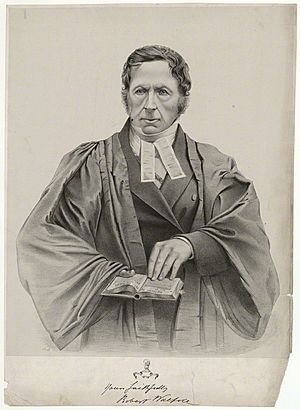Robert Walpole (classical scholar) facts for kids
Robert Walpole (born 1781, died 1856) was an English expert in ancient Greek and Roman studies. He was known for his writings and for editing books about travel and history.
Contents
Early Life and Education
Robert Walpole was born in Lisbon, Portugal, on August 8, 1781. His father, also named Robert Walpole, was a special representative for England in Portugal. His grandfather was Horatio Walpole, 1st Baron Walpole.
Young Robert went to Charterhouse School for his early education. He then studied at two famous universities. He first started at Merton College, Oxford in 1797. Later, in 1800, he moved to Trinity College, Cambridge. He earned his first degree (B.A.) in 1803, followed by a master's degree (M.A.) in 1809, and a B.D. (Bachelor of Divinity) in 1828. In 1803, he also joined Lincoln's Inn, which is a professional association for lawyers.
Travels and Discoveries
After finishing his studies at Cambridge, Robert Walpole traveled to Greece. This trip was very important for his work as a scholar. When he came back, he gave a special gift to the University Library at Cambridge. It was a marble sculpture of a dramatic mask, which he found at an ancient theater in Stratonicea.
Career as a Clergyman
Robert Walpole also became a clergyman in the Church of England. He was made a deacon in 1808 and a priest the next year. He served as a rector (a type of church leader) in several places:
- In 1809, he became rector of Itteringham, Norfolk.
- In 1815, he became rector of Tivetshall, Norfolk.
- In 1828, he became rector of Christ Church, Marylebone, in London.
He continued to serve at Itteringham and Christ Church for the rest of his life. Robert Walpole passed away in London on April 16, 1856.
Important Writings and Edited Works
Robert Walpole was a busy writer and editor. He helped share knowledge about ancient cultures and travel.
Books About Travel and History
In 1817, Walpole published a book called Memoirs relating to European and Asiatic Turkey. This book was so popular that a second edition came out in 1818.
He also edited a two-volume set of books titled Travels in various Countries of the East (published in 1820). These books included many writings that had not been published before. They were from other travelers and scholars, such as:
- John Bacon Sawrey Morritt
- John Sibthorp
- Philip Hunt
Other people who contributed to these travel books included:
- William George Browne
- George Hamilton-Gordon, who wrote about a historical inscription.
- John Hawkins, who shared his travel diary from the Aegean Sea.
- John Squire, who wrote about his journey in Syria.
- Charles Robert Cockerell, who wrote about the ancient city of Knossos and its famous labyrinth.
- William Wilkins, who wrote about the Elgin Marbles, which are ancient sculptures from Greece.
Walpole added his own descriptions of ancient objects and notes to complete these works. He also worked with Sir William Drummond on a book called Herculanensia, published in 1810.
Other Writings
Walpole wrote several other notable works:
- Melite Britannis subacta (1801): This was a Greek poem that won a prize at Cambridge University.
- Comicorum Græcorum Fragmenta (1805): This book contained parts of ancient Greek comedies, with some notes by the famous scholar Richard Porson.
- Isabel: This was a collection of his poetry translations.
- Specimens of scarce Translations of the seventeenth century from the Latin Poets (1805): This book included Walpole's Greek epitaph (a short text written for a tombstone) for John Tweddell, found in the Hephaestion temple.
- Essay on the Misrepresentations of certain Infidel Writers (1812)
After the death of the author Edward Daniel Clarke, Walpole finished the sixth and final volume of Clarke's book series, Travels.
Family Life
On February 6, 1811, Robert Walpole married Caroline Frances Hyde. She was the youngest daughter of John Hyde. They had four children together: two sons and two daughters. One of their sons, Reginald Robert Walpole, became a barrister (a type of lawyer).
 | Jewel Prestage |
 | Ella Baker |
 | Fannie Lou Hamer |


